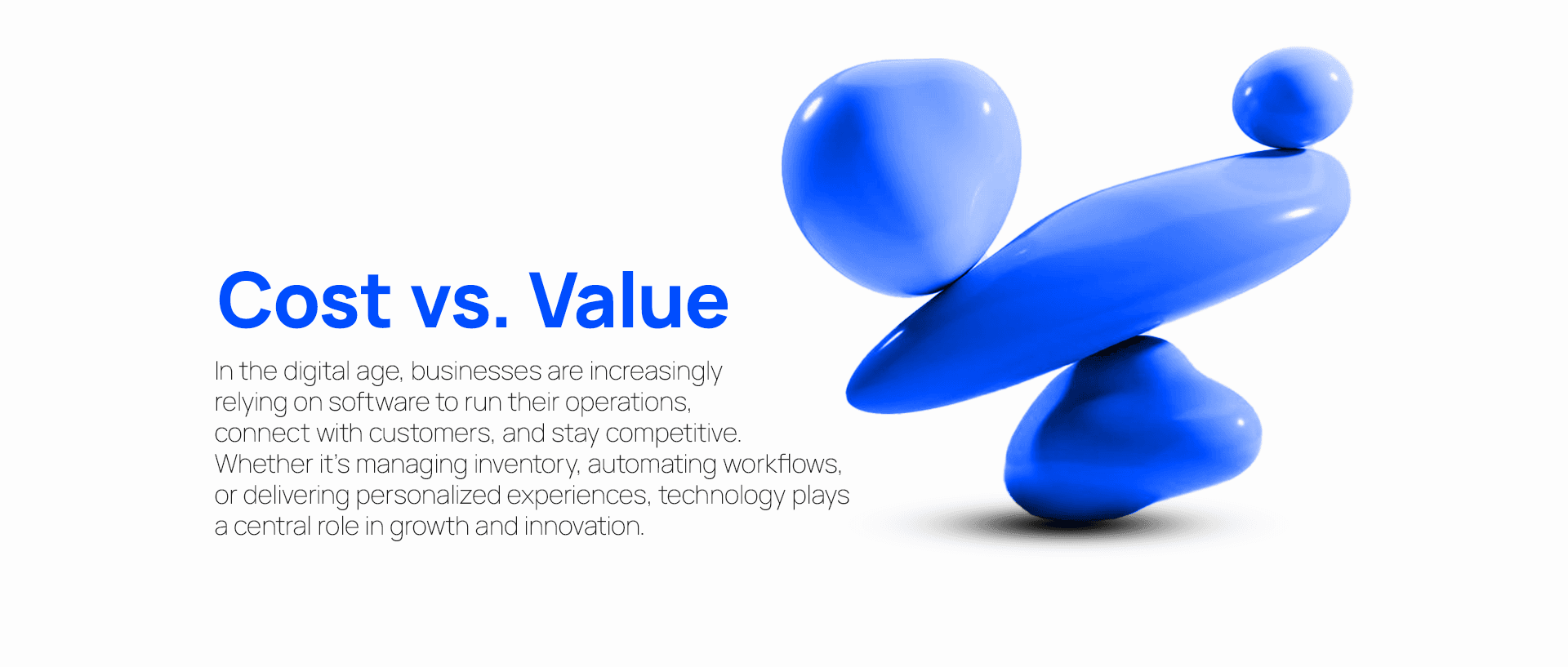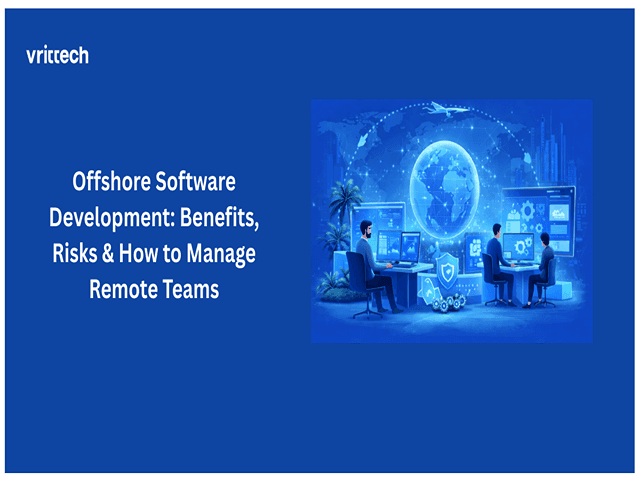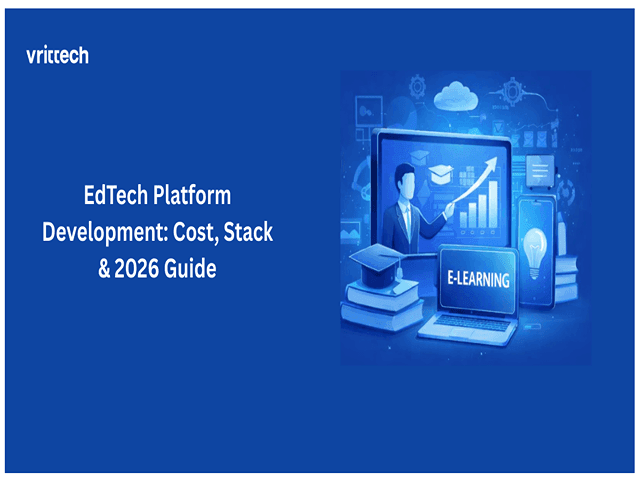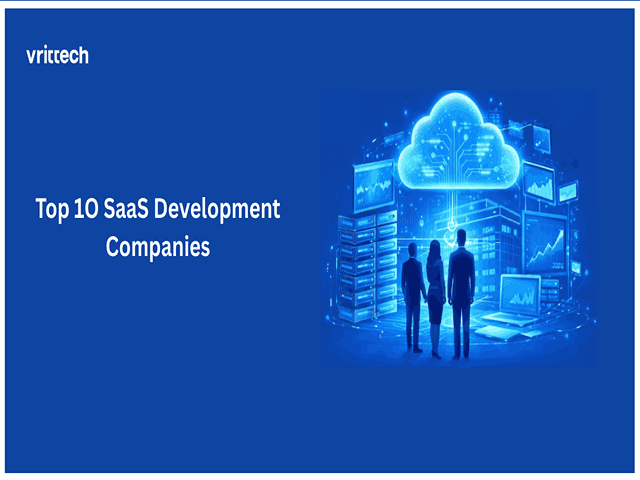Cost vs. Value: Investing in Custom Software for Your Business
Cost vs. Value: Investing in Custom Software for Your Business

Cost vs. Value: Investing in Custom Software for Your Business
In the digital age, businesses are increasingly relying on software to run their operations, connect with customers, and stay competitive. Whether it’s managing inventory, automating workflows, or delivering personalized experiences, technology plays a central role in growth and innovation.
But when it comes to software, many companies face a common dilemma: Should you buy off-the-shelf solutions or invest in custom software development?
While ready-made software might seem cheaper initially, custom software often delivers far greater long-term value. Let’s explore the true difference between cost and value — and why investing in custom software could be one of the smartest decisions your business makes.
Understanding the Cost of Custom Software
At first glance, custom software development can appear expensive. Building a solution from scratch involves several stages — including discovery, design, development, testing, and maintenance.
Costs can vary depending on factors like:
- Project complexity and features
- Design and user experience requirements
- Technology stack
- Integration with existing systems
- Ongoing support and updates
Because of this, business leaders often hesitate, comparing custom solutions to cheaper off-the-shelf products. However, focusing solely on the upfront price tag can be misleading — what truly matters is the value the software delivers over time.
The Hidden Costs of Off-the-Shelf Software
Off-the-shelf software can be appealing because it’s quick to deploy and requires less initial investment. But these solutions often come with hidden limitations that can cost you more in the long run:
- Licensing Fees: Many commercial platforms require ongoing subscription or licensing costs that add up year after year.
- Limited Customization: You may have to adjust your business processes to fit the software — instead of the software fitting your needs.
- Integration Challenges: Connecting off-the-shelf tools with your other systems can be complex or even impossible.
- Feature Overload (or Lack): You might end up paying for features you never use or missing essential ones that are unavailable.
- Scalability Issues: As your business grows, the software might struggle to keep up, forcing you to switch systems later — a costly and time-consuming move.
In short, what looks affordable today may create operational bottlenecks and expenses tomorrow.
The Long-Term Value of Custom Software
Custom software is built specifically for your business — tailored to your goals, workflows, and users. While the upfront cost is higher, the return on investment (ROI) often outweighs it over time. Here’s why:
1. Designed Around Your Business Needs
Every company operates differently. Custom software aligns with your exact processes, eliminating unnecessary steps and automating tasks the way you need them done.
This creates better efficiency, productivity, and consistency across departments — something generic tools can’t match.
2. Scalability and Flexibility
As your business grows, your software can grow with it. Custom-built systems are designed to scale — whether that means supporting more users, integrating new tools, or expanding features.
That flexibility ensures your investment continues to deliver value for years to come.
3. Competitive Advantage
Custom software allows you to do what others can’t. It can offer a unique customer experience, streamline operations in innovative ways, and set you apart from competitors using cookie-cutter solutions.
4. Integration and Automation
Custom software can seamlessly integrate with your existing tools — CRM, ERP, accounting, or analytics platforms — enabling smooth data flow and better decision-making.
That kind of ecosystem reduces manual work, minimizes errors, and increases accuracy across your business operations.
5. Ownership and Control
When you invest in custom software, you own the code and the product. This gives you complete control over updates, data, and future development — without relying on third-party vendors or changing subscription models.
Measuring Value Beyond Cost
When evaluating software investment, think in terms of value metrics rather than just cost:
- Efficiency Gains: How much time and labor will automation save your team?
- Revenue Growth: Will the software help attract new customers or retain existing ones?
- Customer Satisfaction: Can a smoother digital experience improve loyalty and referrals?
- Error Reduction: How much money can you save by minimizing manual mistakes?
Even a modest improvement in these areas can result in significant financial returns over time.
Case Example: Short-Term Cost vs. Long-Term Value
Imagine a mid-sized logistics company choosing between a $25,000 off-the-shelf platform and a $100,000 custom solution.
The ready-made software covers 70% of their needs but lacks key automation features, requiring employees to manually process 200 shipments per week. Over time, this manual work costs the company an extra $5,000/month in labor.
Within two years, that’s $120,000 in hidden costs — more than the price difference between the two options. Meanwhile, the custom software eliminates manual work, improves accuracy, and scales effortlessly as the company grows.
👉 Result: The custom software pays for itself within two years and continues to generate value far beyond that.
Common Misconception: “Custom Software Is Only for Large Enterprises”
It’s a common myth that only big corporations can afford custom software. In reality, modern development frameworks and cloud technologies have made custom solutions more accessible than ever for small and medium-sized businesses.
Startups, local retailers, and service-based companies are increasingly investing in tailored tools to automate operations and enhance customer experiences — often at manageable costs.
When Custom Software Makes the Most Sense
Investing in custom software is particularly valuable when:
- You have unique business processes that don’t fit existing tools
- You’re struggling with multiple disconnected systems
- You plan to scale operations rapidly
- You want to offer a distinct digital experience
- You’re ready to invest in long-term efficiency and growth
If any of these sound familiar, it’s time to look beyond off-the-shelf options and explore what a tailored solution can do for you.
Conclusion
The choice between cost and value often determines whether your software becomes a short-term tool or a long-term asset. While off-the-shelf software may seem affordable initially, its limitations can slow your growth and inflate costs over time.
Written by


